高中英语专题复习 语法
- 格式:doc
- 大小:387.50 KB
- 文档页数:72
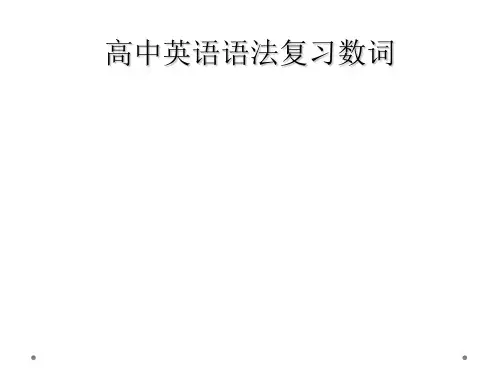
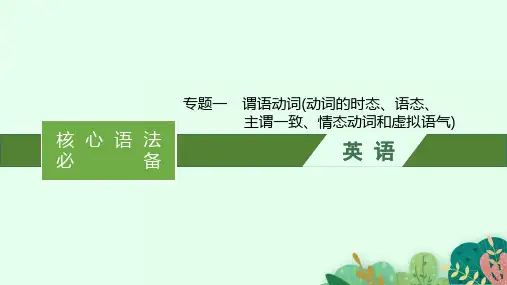
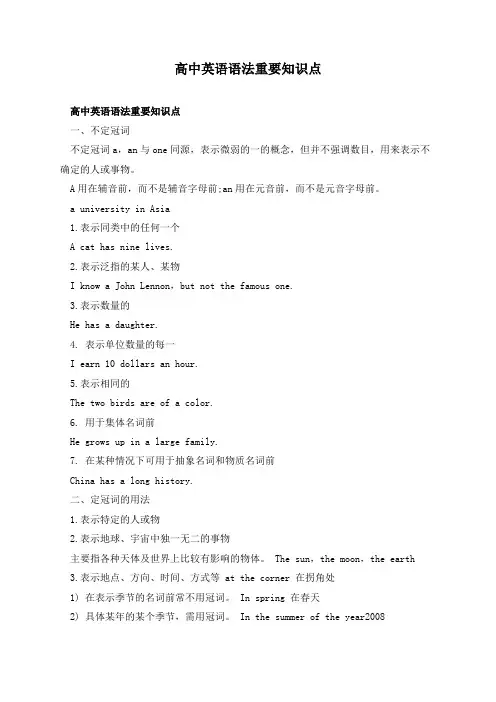
高中英语语法重要知识点高中英语语法重要知识点一、不定冠词不定冠词a,an与one同源,表示微弱的一的概念,但并不强调数目,用来表示不确定的人或事物。
A用在辅音前,而不是辅音字母前;an用在元音前,而不是元音字母前。
a university in Asia1.表示同类中的任何一个A cat has nine lives.2.表示泛指的某人、某物I know a John Lennon,but not the famous one.3.表示数量的He has a daughter.4. 表示单位数量的每一I earn 10 dollars an hour.5.表示相同的The two birds are of a color.6. 用于集体名词前He grows up in a large family.7. 在某种情况下可用于抽象名词和物质名词前China has a long history.二、定冠词的用法1.表示特定的人或物2.表示地球、宇宙中独一无二的事物主要指各种天体及世界上比较有影响的物体。
The sun,the moon,the earth 3.表示地点、方向、时间、方式等 at the corner 在拐角处1) 在表示季节的名词前常不用冠词。
In spring 在春天2) 具体某年的某个季节,需用冠词。
In the summer of the year20083)用于序数词或形容词的最高级前 the first the second4)用于形容词前使其名词化 the rich the poor5)用于复数姓氏前,表示―夫妇‖或全家 The Smiths6)用于乐器名词前 Play the piano7)用于by+the+计量单位名词 By the pound1. 用于复数名词前复数名词泛指某类人或物时,其前通常用零冠词。
Students should obey the school rules. 学生应该遵守校规。
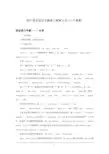
高中英语语法专题复习教案大全(15个教案)语法复习专题一——名词一、考点聚焦1.可数名词单、复数变化形式(1)规则变化。
①单数名词词尾直接加-s。
如:boy —boys, pen —pens。
②以s、x 、ch 、sh结尾的单词一般加-es。
如:glass —glasses,box—boxes, watch —watches, brush —brushes。
特例:stomach —stomachs。
③以“辅音字母+ y”结尾的变“y”为“i”再加“-es”。
如:baby —babies, lady —ladies, fly —flies。
④以“o”结尾的多数加-es。
如:tomato —tomatoes, potato —potatoes, hero —heroes。
但以两个元音字母结尾的名词和部分外来词中以o结尾的词只加-s。
如:radio —radios, zoo —zoos, photo —photos, piano —pianos, kilo —kilos, tobacco —tobaccos。
⑤以“f”或“fe”结尾的名词复数形式变“f”或“fe”为“v”,之后再加-es。
如:wife —wives, life —lives, knife —knives, wolf—wolves, self —selves, leaf —leaves等。
特例:handkerchief—handkerchiefs, roof —roofs, chief —chiefs, gulf —gulfs, belief —beliefs, cliff —cliffs。
⑥改变元音字母的。
如:man —men, mouse —mice, foot —feet,woman —women, tooth —teeth, goose —geese, ox —oxen。
特例:child —children。
⑦复合名词的复数形式。
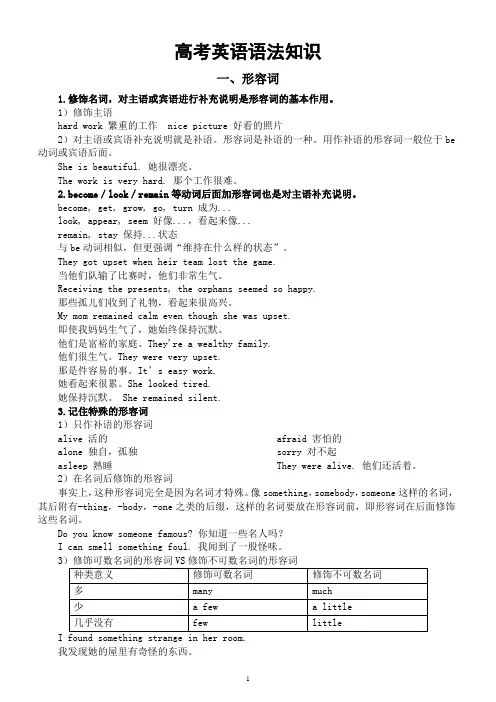
高考英语语法知识一、形容词1.修饰名词,对主语或宾语进行补充说明是形容词的基本作用。
1)修饰主语hard work 繁重的工作 nice picture 好看的照片2)对主语或宾语补充说明就是补语。
形容词是补语的一种。
用作补语的形容词一般位于be 动词或宾语后面。
She is beautiful. 她很漂亮。
The work is very hard. 那个工作很难。
2.become/look/remain等动词后面加形容词也是对主语补充说明。
become, get, grow, go, turn 成为...look, appear, seem 好像...,看起来像...remain, stay 保持...状态与be动词相似,但更强调“维持在什么样的状态”。
They got upset when heir team lost the game.当他们队输了比赛时,他们非常生气。
Receiving the presents, the orphans seemed so happy.那些孤儿们收到了礼物,看起来很高兴。
My mom remained calm even though she was upset.即使我妈妈生气了,她始终保持沉默。
他们是富裕的家庭。
They're a wealthy family.他们很生气。
They were very upset.那是件容易的事。
It’s easy work.她看起来很累。
She looked tired.她保持沉默。
She remained silent.3.记住特殊的形容词1)只作补语的形容词alive 活的alone 独自,孤独asleep 熟睡afraid 害怕的sorry 对不起They were alive. 他们还活着。
2)在名词后修饰的形容词事实上,这种形容词完全是因为名词才特殊。
像something,somebody,someone这样的名词,其后附有-thing,-body,-one之类的后缀,这样的名词要放在形容词前,即形容词在后面修饰这些名词。
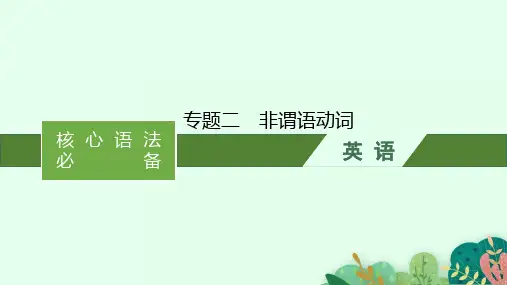
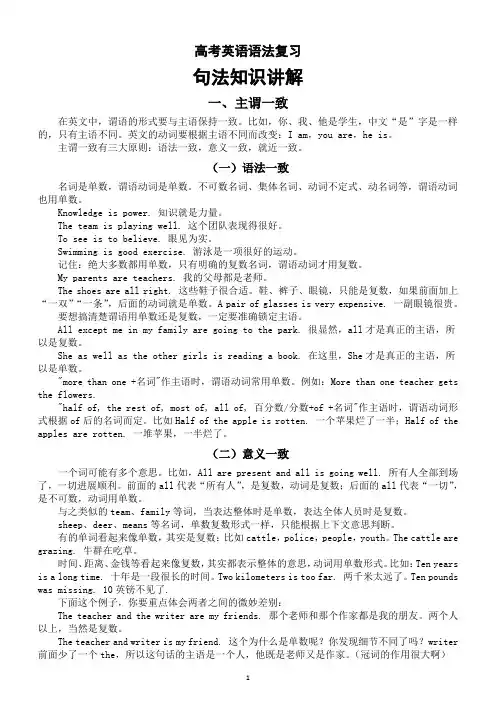
高考英语语法复习句法知识讲解一、主谓一致在英文中,谓语的形式要与主语保持一致。
比如,你、我、他是学生,中文“是”字是一样的,只有主语不同。
英文的动词要根据主语不同而改变:I am,you are,he is。
主谓一致有三大原则:语法一致,意义一致,就近一致。
(一)语法一致名词是单数,谓语动词是单数。
不可数名词、集体名词、动词不定式、动名词等,谓语动词也用单数。
Knowledge is power. 知识就是力量。
The team is playing well. 这个团队表现得很好。
To see is to believe. 眼见为实。
Swimming is good exercise. 游泳是一项很好的运动。
记住:绝大多数都用单数,只有明确的复数名词,谓语动词才用复数。
My parents are teachers. 我的父母都是老师。
The shoes are all right. 这些鞋子很合适。
鞋、裤子、眼镜,只能是复数,如果前面加上“一双”“一条”,后面的动词就是单数。
A pair of glasses is very expensive. 一副眼镜很贵。
要想搞清楚谓语用单数还是复数,一定要准确锁定主语。
All except me in my family are going to the park. 很显然,all才是真正的主语,所以是复数。
She as well as the other girls is reading a book. 在这里,She才是真正的主语,所以是单数。
"more than one +名词"作主语时,谓语动词常用单数。
例如:More than one teacher gets the flowers."half of, the rest of, most of, all of, 百分数/分数+of +名词"作主语时,谓语动词形式根据of后的名词而定。

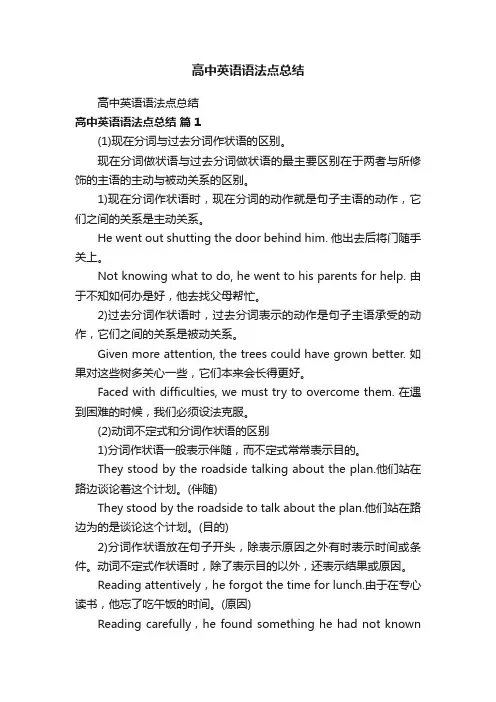
高中英语语法点总结高中英语语法点总结高中英语语法点总结篇1(1)现在分词与过去分词作状语的区别。
现在分词做状语与过去分词做状语的最主要区别在于两者与所修饰的主语的主动与被动关系的区别。
1)现在分词作状语时,现在分词的动作就是句子主语的动作,它们之间的关系是主动关系。
He went out shutting the door behind him. 他出去后将门随手关上。
Not knowing what to do, he went to his parents for help. 由于不知如何办是好,他去找父母帮忙。
2)过去分词作状语时,过去分词表示的动作是句子主语承受的动作,它们之间的关系是被动关系。
Given more attention, the trees could have grown better. 如果对这些树多关心一些,它们本来会长得更好。
Faced with difficulties, we must try to overcome them. 在遇到困难的时候,我们必须设法克服。
(2)动词不定式和分词作状语的区别1)分词作状语一般表示伴随,而不定式常常表示目的。
They stood by the roadside talking about the plan.他们站在路边谈论着这个计划。
(伴随)They stood by the roadside to talk about the plan.他们站在路边为的是谈论这个计划。
(目的)2)分词作状语放在句子开头,除表示原因之外有时表示时间或条件。
动词不定式作状语时,除了表示目的以外,还表示结果或原因。
Reading attentively,he forgot the time for lunch.由于在专心读书,他忘了吃午饭的时间。
(原因)Reading carefully,he found something he had not knownbefore.他仔细读书时,发现了一些从前不知道的东西。
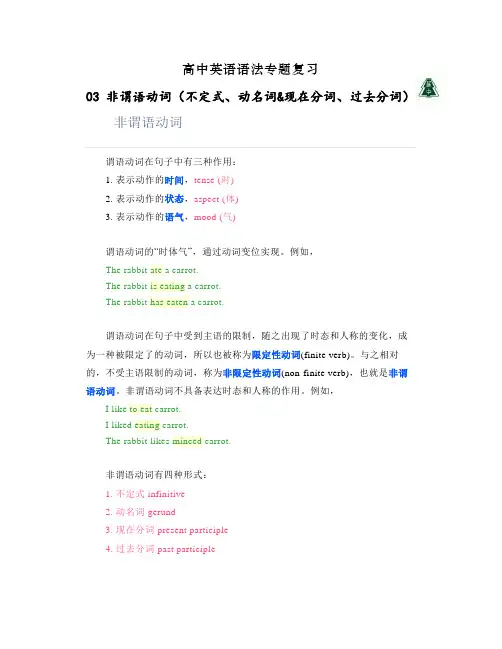
高中英语语法专题复习03 非谓语动词(不定式、动名词&现在分词、过去分词)非谓语动词谓语动词在句子中有三种作用:1. 表示动作的时间,tense (时)2. 表示动作的状态,aspect (体)3. 表示动作的语气,mood (气)谓语动词的“时体气”,通过动词变位实现。
例如,The rabbit ate a carrot.The rabbit is eating a carrot.The rabbit has eaten a carrot.谓语动词在句子中受到主语的限制,随之出现了时态和人称的变化,成为一种被限定了的动词,所以也被称为限定性动词(finite verb)。
与之相对的,不受主语限制的动词,称为非限定性动词(non-finite verb),也就是非谓语动词。
非谓语动词不具备表达时态和人称的作用。
例如,I like to eat carrot.I liked eating carrot.The rabbit likes minced carrot.非谓语动词有四种形式:1. 不定式 infinitive2. 动名词 gerund3. 现在分词 present participle4. 过去分词 past participle谓语动词是简单句的核心动词,非谓语动词只可能出现在其他的句子成分中。
1. 主语例:Swimming makes us hale and hearty.2. 宾语例:Janet suddenly stopped talking.3. 表语/主语补语例:Her wish is to become a doctor in the future.4. 宾语补语例:I invited him to come here.5. 定语例:Don't disturb the sleeping dog.6. 状语例:He went to the supermarket to buy a pen.不定式、动名词句子的核心动词只能由谓语动词充当,而非谓语动词可以充当句子的其他成分。
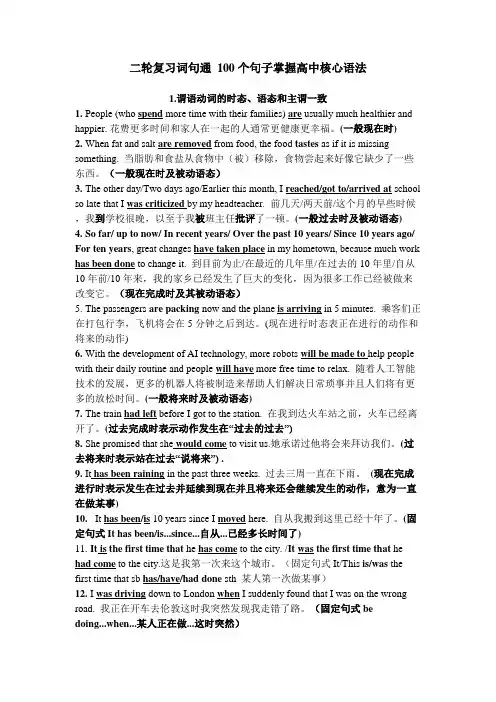
二轮复习词句通100个句子掌握高中核心语法1.谓语动词的时态、语态和主谓一致1.People (who spend more time with their families) are usually much healthier and happier. 花费更多时间和家人在一起的人通常更健康更幸福。
(一般现在时)2.When fat and salt are removed from food, the food tastes as if it is missing something. 当脂肪和食盐从食物中(被)移除,食物尝起来好像它缺少了一些东西。
(一般现在时及被动语态)3.The other day/Two days ago/Earlier this month, I reached/got to/arrived at school so late that I was criticized by my headteacher. 前几天/两天前/这个月的早些时候,我到学校很晚,以至于我被班主任批评了一顿。
(一般过去时及被动语态)4.So far/ up to now/ In recent years/ Over the past 10 years/ Since 10 years ago/ For ten years, great changes have taken place in my hometown, because much work has been done to change it. 到目前为止/在最近的几年里/在过去的10年里/自从10年前/10年来,我的家乡已经发生了巨大的变化,因为很多工作已经被做来改变它。
(现在完成时及其被动语态)5.The passengers are packing now and the plane is arriving in 5 minutes. 乘客们正在打包行李,飞机将会在5分钟之后到达。
高中英语语法知识点总结高中英语语法知识点总结语法是英语里面最难去也是最重要的一部分,升上高中,我们要学习和掌握的语法知识变得更多更难了。
下面是店铺为大家整理的高中英语语法知识归纳,希望对大家有用!高中英语语法知识归纳名词性从句重难点1. 在名词性从句中,疑问句要用陈述句的语序。
例如:①Can you make sure ____the gold ring ?(MET90)A.where Alice had put D.where has Alice put2. 动词 doubt 用在疑问句或否定句中,其后宾语从句常用 that 作连接词;用在肯定句中,连接词用 whether 或 if 皆可,而不用 that。
3. 否定转移问题。
①将think, believe, suppose, expect, fancy, guess, imagine等动词后面跟宾语从句时否定转移我想我并不认识你。
我相信他不回来。
We dont expect he will come tonight , will he ?注意:若谓语动词为hope,宾语从句中的否定词不能转移。
I hope you werent ill. 我想你没有生病吧。
②将seem, appear 等后的从句的否定转移看来他们不知道往哪去。
看来我们明天不会碰上好天气。
4. 主谓一致问题。
. .5. 语气问题① 在含有 suggest , order , demand , propose , command , request , insist, desire, require, advise 等表示要求、命令、建议、决定等意义的动词后,that从句常用“should+ 动词原形”的结构我建议我们应该立刻出发。
② 在It is +过去分词+that的主语从句中 decided,demanded,desired,insisted,ordered,proposed,suggested,recommended,requested, required等。
高中英语语法整理总结归纳高中英语语法归纳总结介词I. 要点1、介词和种类(1) 简单介词,常用的有at, in, on, about, across, before, beside, for , to, without等。
(2) 复合介词,如by means of, along with, because of, in front of, instead of等。
2、介词和其他词类的习惯搭配关系(1) 和动词的搭配,如agree with, ask for, belong to, break away from, care about等。
(2) 和形容词的搭配,如afraid of, angry with, different from, good at(3) 和名词的搭配,如answer to , key to, reason for, cause of, visit to等.3、介词短语可以有自己的修饰语,这种修饰语通常有right, just, badly, all, well, directly, completely等少数几个副词。
如:He came right after dinner.He lives directly opposite the school.4、某些介词的意义与用法举例(1) at, on, in(表时间)表示时间点用at,如at four oclock, at midnight等;表示不确定的时间或短期假日也用at,如at that time, at Christmas等。
指某天用on, 如on Monday, on the end of November, 指某天的朝夕用on,如on Friday morning, on the afternoon of September 1st 等。
指长于或短于一天的时段用in,如in the afternoon, in February, in Summer, in 1999等。
高中英语语法大全英语语法其实并不难,它的精髓在于掌握语言的使用,平常多练多说。
今天小编在这给大家整理了高中英语语法大全,接下来随着小编一起来看看吧!高中英语语法1一、主语从句1.定义:用作主语的从句叫做主语从句。
2.构成:关联词+简单句3.引导主语从句的关联词有三类:(1)从属连词that。
如:Thattheywereintruthsisterswasclearfromthefacialresemblancebet weenthem.很明显,她们确是亲姐妹,她们的脸型很相似。
(2)从属连词whether。
如:Whetherhe’llcomehereisn’tclear.他是否会来这里还不清楚。
(3)连接代词who,whom,whose,what,which,whoever,whatever,whichever连接副词where,when,how,why。
如:Whatshedidisnotyetknown.她干了什么尚不清楚。
Howthishappenedisnotcleartoanyone.这事如何发生的,谁也不清楚。
Whoevercomesiswelcome.不论谁来都欢迎。
Whereveryouareismyhome----myonlyhome.你所在的任何地方就是我的家----我唯一的家。
二、宾语从句1.定义:用作宾语的从句叫宾语从句。
2.构成:关联词+简单句3.引导宾语从句的关联词有三类:(1)从属连词that。
如:Hetoldusthathefeltill.他对我们说他感到不舒服。
Iknowhehasreturned.我知道他已经回来了。
注:that在引导宾语从句时也并不是任何情况下都可以省略。
在以下情况下,that 不能省略。
1.EverybodycouldseewhathappenedandthatTomwasfrighten ed.(and连接两个宾语从句,that宾语从句放在and的后面时,that不能省略。
高中英语语法复习专题讲解-形容词副词一、考点聚焦1、形容词、副词的作用与位置形容词是用来修饰名词的,常被放在名词前作定语,或放在系动词后面作表语。
而副词则用来修饰形容词、动词,其他副词或者句子,一般位于形容词之前,动词之后或句子之首。
以下属几种特殊情况,须牢记;(1)形容词短语作定语,定语后置。
a language difficult to master, a leaning tower about 180 feet high(2)表语形容词(afraid、alike、alone、asleep、awake、alive等)作定语,定语后置。
如a man alive。
有些表身体健康状况的形容词如well、faint、ill只作表语。
sick既可作表语又可作定语,ill如作定语意为“bad”。
(3)用作定语,修饰由不定代词one、no、any、some和every构成的复合词如anything、something等时,通常后置。
如:I have something important to tell you.(4)else常用作疑问代词和不定代词的后置定语。
(5)enough、nearby修饰名词前置或后置,程度副词一般位于形容词、副词前面,enough修饰形容词、副词时,必须后置。
(6)几个副词并列作状语时,其顺序较灵活,但一般是:方式→地点→时间。
如:We had a good time together outdoors last Sunday.(7)频度副词如often、always、usually等在be动词后,行为动词前。
(8)副词作定语,定语后置。
如:The person there is waiting for you.(9)几个并列的形容词作定语,其语序通常为:限定语(The、A)+ 描绘性形容词+ size(大小)+ shape (形状)+ age(年龄、时间)+ color(颜色)+ origin(国籍、来源)+ material(材料)+ purpose(目的)+ 名词。
高三英语二轮复习专题一动 词 时 态考点提示:考点一:一般时1、一般现在时(1)表示习惯性、经常性的动作或现在的状态、特征。
(2)表示客观真理、科学事实、格言以及其他不受时间限制的客观存在的事实。
此用法如果出现在宾语从句中,即使主句谓语是过去时,从句谓语也要用一般现在时。
He proved that the earth is round.(3)一般现在时表将来的用法:① 在时间状语从句、让步状语从句和条件状语从句中,常用一般现在时代替一般将来时。
You will surely succeed if you try your best.② 表示按规定、计划或时间表将要发生的动作或事件,或者事先安排好的动作。
常见的有此用法的动词(短语)有go, come, leave, start, begin, arrive, end, finish, take off 等。
The meeting begins at 2:00 in the afternoon and ends at 5:00.2、一般过去时(1)表示在过去某一时间......所发生的动作或存在的状态或过去一段时间内.......经常性或习惯性的动作。
Tom went to Canada two years ago. He worked there for a few months and then went to America.(2)一般过去时用于if 引导的虚拟条件从句或It is time that…, I wish…, Iwould rather (that)…, if only…, as though / if…结构中表示现在或将来。
(3) 在时间、条件状语从句中,常用一般过去时代替过去将来时3、一般将来时(1)“will / shall +动词原形”表示将来发生的动作或存在的状态,will 还可表临时决定。
— Who is at the door, Tom?— I‟ll get it.(2)“be going to +动词原形”表示①现在打算、计划、准备要做某事。
②有迹象表明要发生的动作。
(3) be to do 表示①预先安排好的计划或约定要做某事 ②表示说话人的意志、意图、职责、义务、命令等 ③ 表示注定要发生的事情(4) be about to do 不可与具体的时间状语连用,但可以和when 连用,表示“正要做某事,就在这时”。
考点二:进行时1、现在进行时 (am / is / are doing )(1)表示此刻正在进行的动作或现阶段正在进行而此刻不一定正在进行的动作。
She is learning playing the piano from Mr. Smith these days.(2) 表示将来,主要表示按计划或安排要发生的动作,此类动词常为趋向性动词,如go, start, set out, leave, arrive, come, return 等。
(3)与always, constantly等副词连用时表达满意、称赞、惊讶、厌恶等感情色彩。
2、过去进行时(was / were doing)(1)表示过去某一时刻或某一时间内正在进行的动作, 常用来表示过去某一动作发生的背景He hurt his leg when he was playing basketball. “把腿弄伤”发生在“打篮球”的过程中,“打篮球”就是“弄伤腿”的背景。
(2)表示委婉语气,只限于等动词,表示客气地询问,尤其是请别人帮助时。
(3)与always, constantly等副词连用时表达满意、称赞、惊讶、厌恶等感情色彩。
3、将来进行时(will be doing)(1)表示将来某一时刻或某段时间内正在进行的动作或存在的状态,常与特定的表示将来的时间状语连用,如at this time tomorrow morning.考点三:完成时1、现在完成时(have /has done)(1)表示过去发生的动作对现在产生的影响或造成的结果,常与yet, already, just, before, lately等时间状语连用。
(2) 开始与过去、持续到现在并可能持续下去的动作或状态,常同these days, recently, so far, for+时间段和since+时间点等连用。
(3) 常用现在完成时的固定句型:①This / It / That is the first ( second, third…) time (that) … ②This / That / It is the +最高级+名词+that 从句③It +have been +一段时间+since2、过去完成时(had done)(1)表示在过去某一时刻或某一动作之前已经完成的动作,表“过去的过去”。
(2)want, hope, mean, plan, intend 等动词的过去完成时可用来表示过去未曾实现的想法、希望、打算或意图,意为“本来…”(3) 常用过去完成时的固定句型①hardly / scarcely +过去完成时when +一般过去时(no sooner … than …)②It was the first / second / … time + that + 过去完成时③by (the time) + 过去时间,主句用过去完成时3、将来完成时(will have done)(1)表示在将来某时/某动作之前已经完成的动作。
常与时间状语“by +将来时间”等连用。
考点四:完成进行时1、现在完成进行时(have /has been doing)(1)表示动作从过去某时开始一直持续到现在,并有可能持续下去。
(2)表示到目前为止的异端时间内动作时断时续、反复发生。
2、过去完成进行时(had been doing)(1)表示在过去某一时间之前一直在进行的动作或存在的状态。
(2)表示在过去某段时间内反复发生的动作。
考点五:几种易混时态的区别1、一般过去时与现在完成时2、现在完成时与现在完成进行时3、一般过去时与过去完成时一、单句改错1. Will you help me to look for an important file I left in my office this morning immediately you will arrive?2. Mr. Smith is leaving Hong Kong in several days. Do you know when the earliest plane will take off at the weekend?3. John always gets up too late, and never had enough time for breakfast.4. I knew he wrote a book last year, but I don‟t know if he has finis hed it.5. When she realized I had photographed her, she quickly made a pose, smiling.二、用所给动词的适当形式填空1. I thought I _______________ (lose) my cell phone somewhere. But it is on the back seat of my car.2. — How was your weekend, Joshua?— Awful! That was the first time I ____________________ (leave) alone at home, bored to death.3. I __________(live) in New York for many years, but I‟ve never regretted my final decision to move back to China.4. By this time next summer, you ____________________ (find) a well-paid job. I, on the other hand, will still be studying.5. Once employed, Simon ________________ (send) to Africa to do market research.6. —Ann _____________________ (work) since 8 o‟clock without a break.— No wonder that she looks rather tired.7. — Did Mary repair the bike herself?— She _________ it__________ (repair) because she knew nothing about bikes.8. In the long run, it is high time that world governments _________________ (conduct) serious campaigns against smoking.9. — Would you please repeat it?— Obviously, you ____________________________ (not listen to) me.10. — My car ____________________________ (break) into twice this month.—I‟m sorry to hear that.三、单项选择1. — Look! Somebody ________ the sofa.— Well, it wasn‟t me. I didn‟t do it. (2012 江西)A. is cleaningB. was cleaningC. has cleanedD. had cleaned2. “The moment ____ soon,” he thought to himself, waiting nervously.(2012 湖南)A. cameB. has comeC. was comingD. is coming3. The manager was concerned to hear that two of his trusted workers __.(2012山东)A. will leaveB. are leavingC. have leftD. were leaving4. — Bob has gone to California.— Oh, can you tell me when he ________? (2011 北京)A. has leftB. leftC. is leavingD. would leave5. Peter had intended to take a job in business, but _____ that plan after the unpleasant experience in Canada in 2010. (2012 浙江)A. had abandonedB. abandonedC. abandonD. will abandon6. After school we went to the reading-room to do some reading, only to be told that it _____. (2012 安徽)A. was decoratedB. had decoratedC. had been decoratingD. was being decorated7. — What a mistake!— Yes, I ________ his doing it another way, but without success.(2011 四川)A. was suggesting B. will suggestC. would suggestD. had suggested8. —I hear you _______ in a pub. What‟s it li ke? (2011江苏)—Well, it‟s very hard work and I‟m always tired, but I don‟t mind.A. are workingB. will workC. were workingD. will be working9. Bob would have helped us yesterday, but he _________. (2010 安徽)A. was busyB. is busyC. had been busyD. will be busy10. When I talked with my grandma on the phone, she sounded weak, but by the time we _______ up, her voice had been full of life. (2009 北京)A. were hangingB. had hungC. hungD. would hang11. My parents have promised to come to see me before I ___ for Africa. (2009 辽宁)A. have leftB. leaveC. leftD. will leave12. The three of us _____ around Europe for about a month last summer. (2012天津)A. traveledB. have traveledC. had traveledD. travel13. — Kevin, you look worried. Anything wrong?—Well, I _______ a test and I‟m waiting for the result. (2012重庆)A. will takeB. tookC. had takenD. take14. Excuse me. I ________ I was blocking your way. (2010 全国卷II)A. didn‟t realizeB. don‟t realizeC. haven‟t realizedD. wasn‟t realizing15. Close the door of fear behind you, and you ______ the door of faith open before。